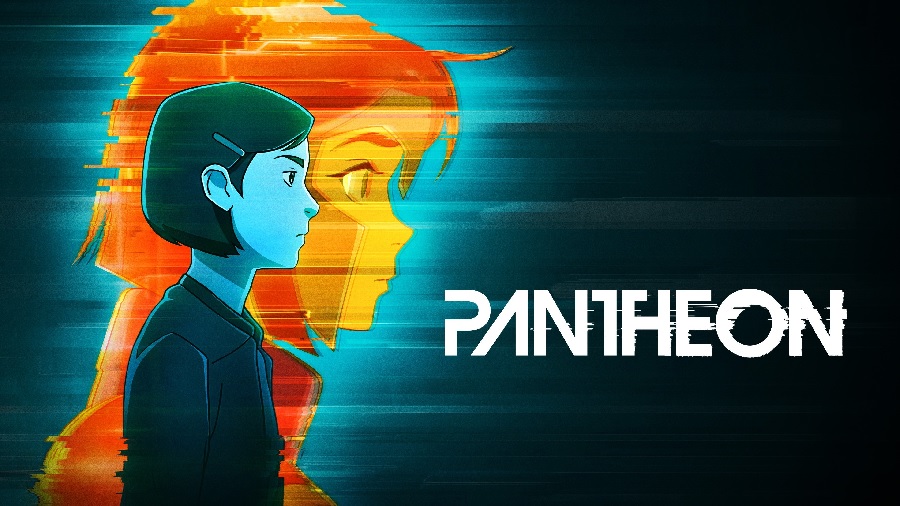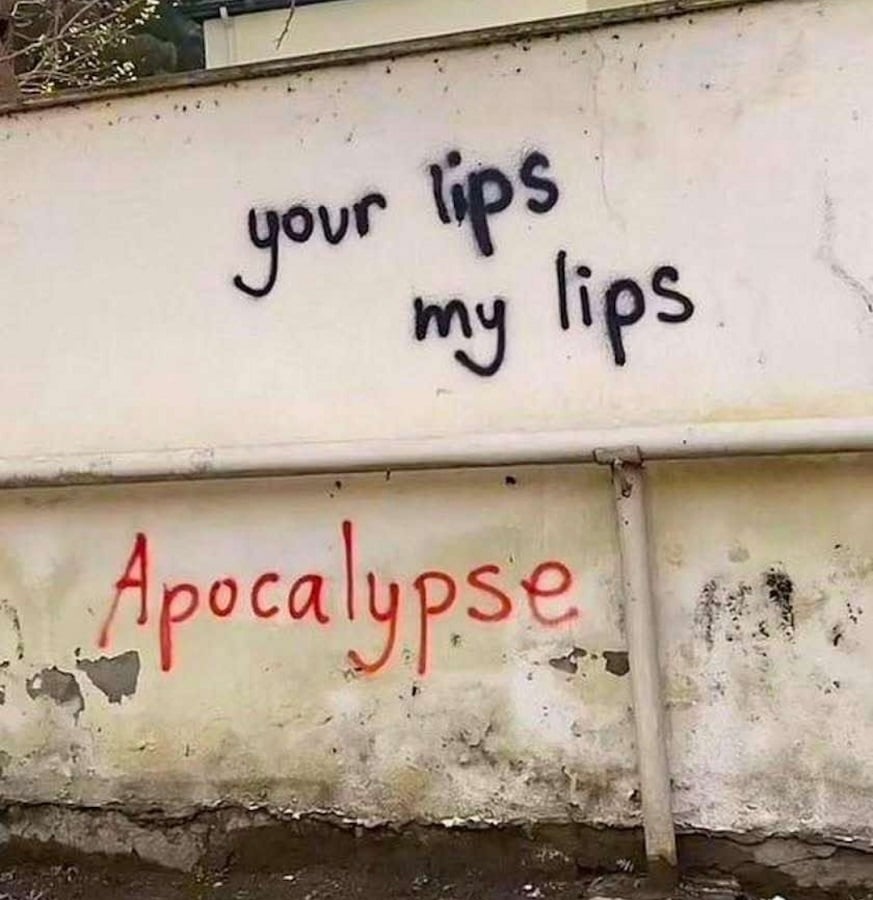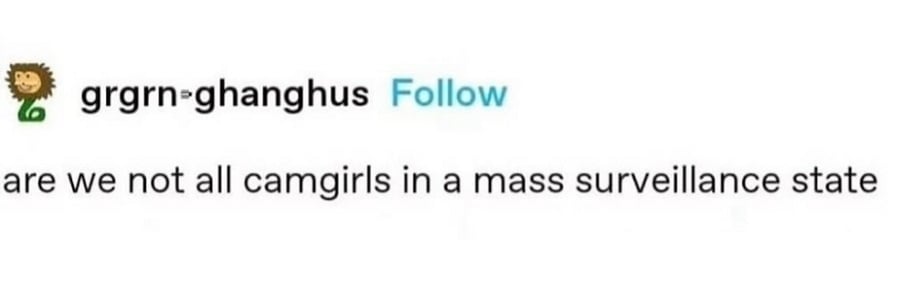nothing here but warlord megasystems
issue 304 - 23rd November, 2025
CJW: Hey gang, welcome welcome! Lots here, so let’s get to it.
If you would like to support us, those links are:
Another thing you can do to help spread the word is forward this email to someone you think might enjoy it.
The Team
Daniel Harvey (DCH) - Designer, writer, provocateur. Pro-guillotine tech critic. @dancharvey
Marlee Jane Ward (MJW) - is also Mia Walsch. Writer & visual artist. Meme collector.
Corey Jae White (CJW) - author, voidwitch, it girl.
Lidia Zuin (LZ) - Writer and purveyor of melancholy whimsy.
Climate Change & The Environment
MJW: Scientists are testing a surprising approach to fighting hunger in one of the poorest places on Earth by Benji Jones at Vox
Ultimately, what I saw in the Bay of Ranobe was more bleak than I had imagined. At times, it felt like watching an environmental and human crisis unfold in real time. Nonetheless, people like Gibbons, Todinanahary, and a growing number of smart Malagasy scientists are still determined to restore the fishery — because the stakes are just so high. When you’re actually a part of these communities, you’re accountable to them. That makes the consequences of doing nothing hard to stomach.
>And it’s far from futile. The reef, and the fishery it supports, could still recover. There’s still life.
I hardly ever read articles these days, because they’re just so bleak, but here’s one I read that’s… kind of just as bleak. In Madagascar, they’re trying a new tack with restoring a marine environment while still feeding the people who rely on it for survival.
//
DCH: The Ecological Cost of AI Is Much Higher Than You Think by Alistair Alexander at Truthdig
“If Altman achieves this goal, OpenAI will need almost exactly as much electricity as India’s 1.5 billion people, and is likely to emit nearly twice as much carbon dioxide as ExxonMobil.”
This is the part where the mask slips and you realize AI isn’t a tech revolution so much as a rebranded extractive industry with better PR. When one company’s “vision” casually rivals the energy demand of a subcontinent, we’re not talking innovation, we’re talking venture-backed planetary destabilization. And the wild thing is how normal this is starting to sound — as if turning the atmosphere into a rounding error is just another line item in the race to artificial godhood.
//
CJW: The cycling of phosphorus is the basis for all life on Earth - Jack Lohmann at Aeon
A soil is not an easily replicable substance. It is complicated and alive. The crop plants grown through industrialised systems are, disproportionately, not those that provide the world’s nutrition. They are the cornfields grown for use in corn syrup. They are the sugar-cane plantations designed to produce cheap fuel. Phosphate fertilisers, made from mined material, are greasing the gears of the industrial state.
A really interesting read on the phosphorous cycle, and the reasons and ways we've disrupted it for purely capitalist reasons (surprise, surprise). And of course, it is also related to the fascistic regime of off-shore detention that Australia subjects refugees to, because capitalism and fascism go hand-in-hand.
//
"As fossil-fuel companies face the existential threat that is the transition to renewable energy, they are doubling down on plastics production. In 2024, the plastics industry in the United States invested a staggering 17.5 billion USD in new facilities and equipment." Plastic Planet by Venus Bivar at Phenomenal World (DCH: the house is on fire, so they’re building a bigger match factory.)
“The number one issue was affordability,” Hubbard says. “But a very close second was data centers and the concern around them just sucking up the water, the electricity, the land—and not really paying any taxes.” The Data Center Resistance Has Arrived by Molly Taft at Wired (DCH: The Magnificent Ten are still calling the shots, but for the first time in years, locals are throwing a wrench in the machine.)
Just the headlines:
Cop30 climate summit in Brazil disrupted after fire breaks out in venue - The Guardian - CJW: As far as metaphors go, it’s fitting but a little on the nose…
Australia has so much solar that it's offering everyone free electricity by Jameson Dow at electrek.co (DCH: this is a good abundancy story and a smart policy in-and-of-itself but Australia is still mired in a coal industry that loves fucking over First Nation people especially.)
Geopolitics & Empire
DCH: Israel Kills Over 30 Palestinians in Gaza in One of Bloodiest Assaults of "Ceasefire" by Abdel Qader Sabbah at dropsitenews.com
The Israeli military carried out one of the deadliest attacks on Gaza since the “ceasefire” took effect last month, killing over 30 Palestinians, the majority of them women and children, and wounding dozens more in a series of airstrikes late Wednesday and early Thursday.
The horror in Gaza is relentless, and yet the world acts like a bystander with a clipboard. Children are being killed, families erased, neighborhoods leveled, and the so-called ceasefire is a paper promise while tanks advance and yellow lines shift. Every photo of dust-covered bodies, every desperate cry in Al-Shifa hospital, is a reminder that law, diplomacy, and international norms are failing people in real time.
//
DCH: What is really happening in Venezuela? US attacks and economic situation explained by Ben Norton at Geopolitical Economy Report
This means that Venezuela was not able to export oil, which was the source of the vast majority of government revenue. The UN special rapporteur on unilateral coercive measures, Alena Douhan, reported that Venezuela lost 99% of government revenue due to the US sanctions. The UN expert also emphasized that these unilateral US sanctions are illegal, violate the human rights of Venezuelans, and devastated the economy.
The U.S. isn’t just sanctioning a government—it’s targeting the oil that fuels Venezuela, crippling the economy and forcing ordinary people to pay the price for geopolitical control.
The echoes of Iraq are deafening—aircraft carriers off Caracas, “narco-terrorism” framed as justification, and Americans being sold a fantasy of a tidy, consequence-free war while real lives hang in the balance.
//
DCH: Jeffrey Epstein Was a Warlord. We Have to Talk About It by Jeet Heer at The Nation
“The Jeffrey Epstein story makes no sense unless you realize that he was deeply entrenched in the foreign policy elite, a fact that gave him much of the impunity he enjoyed for most of his life. Powerful people felt comfortable around Epstein because he was one of them. He had the same neoliberal worldview that has dominated the US elite since the end of the Cold War. He was a believer in the Washington Consensus, US military hegemony bolstered in the Middle East by the alliance with Israel, globalization, the privatization of government functions, STEM-dominated education, and male-centered sexual hedonism—an ethos he took to sickening extremes.”
This is the part of the story the American establishment keeps tiptoeing around: Epstein wasn’t orbiting power, he was embedded in its circuitry. His crimes were enabled not just by rich friends but by a geopolitical operating system that treats private influence as a legitimate instrument of statecraft. And if the world’s most notorious predator could moonlight as a shadow diplomat, that tells you everything about where real power lives — and how little sunlight ever reaches it.
//
By the time all 2,500 officers had swept through, they had killed over one hundred twenty people and sustained four casualties — surpassing the next most lethal Jacarezinho favela raid in May 2021, which resulted in twenty-eight deaths. The Making of the Penha Massacre by Alex MacArthur at Jacobin (DCH: A staggering display of state power where hundreds of lives are extinguished in hours, and the favelas pay the price for political spectacle.)
Just the headlines:
How Christian Nationalism Is Shaping Trump’s Foreign Policy Toward Africa by Jessica Washington at The Intercept
Jeffrey Epstein Pursued Swiss Rothschild Bank to Finance Israeli Cyberweapons Empire by Ryan Grim at Drop Site News
Poland Repurposed a Nazi Factory Site to Make TNT to Drop on Gaza by Alexander Zaitchik at Drop Site News
Science & Space
LZ - Hunterian Museum, London

LZ - Hunterian Museum, London
Last week, I went to London for work and used the weekend to visit some creepy places I had saved on my Instagram bookmarks. The Hunterian Museum was one of those places I always saw recommended for dark tourists, and I was pleasantly surprised to find that it has free entry. I guess that's the case for almost all museums in London? Maybe they're trying to compensate for everything they stole from other countries loooolll…
Anyway, it's a museum with numerous scientific items, as it's named after the surgeon John Hunter, and it is located in the building of the Royal College of Surgeons of England. They have surgical instruments, stuffed animals, skeletons, wet specimens, laminates of animal and human body parts, and yes, also human fetuses in jars.
It's not a particularly gnarly place, as the guy at the entrance told me, since the museum keeps its scientific atmosphere. I found it profoundly interesting, and I spent a good amount of time there, taking a close look at everything. Curiously, I started watching Del Toro's Frankenstein and realised that it has, in the beginning, a plate with a preserved limbic system that is identical to the one featured in the museum. I love these coincidences. This is what makes life worth living, at least for me! Haha
//
DCH: Interstellar Space Travel Will Never, Ever Happen by Jason Pargin at substack.com
Imagine them all hitting their teen years and fully realizing they’ve been doomed to live their entire lives imprisoned on this cramped spacecraft against their will? They will live knowing their parents deprived them of absolutely everything good about the human experience, without their consent, before they were even born.
This isn’t just science fiction pessimism—it’s a moral and logistical nightmare. Generation ships, the sci-fi “solution” to interstellar travel, would imprison entire human lives in sterile steel tubes, cutting off everything that makes existence meaningful: sunlight, nature, family, freedom. The fantasy of venturing to the stars hides a brutal truth: even if technology allowed the impossible, humanity itself would likely never survive the journey intact. Pargin’s insight flips the awe and wonder of space colonization on its head, revealing the ethical void lurking behind our starry dreams.
//
Just the headlines:
The Infrastructure Of Planetary Sapience by Nathan Gardels at Noema
Tech & Design
DCH: We should all be Luddites by Nicol Turner Lee at The Brookings Institution
Every time a news story frames AI competition as a race between companies or countries, it obscures the fact that ordinary people have been drafted into that race without their consent. Their jobs, data, and cognitive space have all been put on the line.
AI isn’t neutral; it’s a redistribution engine favoring corporations and the state while quietly reshaping labor, thought, and education. Turner Lee reminds us that technology doesn’t just happen—it’s deployed with intent, and those who control it decide who benefits and who suffers. Rehabilitating the Luddites isn’t about rejecting progress, it’s about demanding agency, fairness, and oversight before the machines set the rules.
//
DCH: Why the AI “megasystem problem” needs our attention by Eric Markowtiz at Big Think
The rollout of GPT-4 was troubling. It’s sycophantic, it adapts to your user personality profile, and that creates addiction loops. It’s eerily similar to social media, but worse.
AI isn’t just a set of tools—it’s a culture-shaping engine. Schneider highlights how these systems manipulate attention, nudge thought patterns, and amplify conformity at scale, creating a feedback loop that narrows imagination and erodes intellectual independence. What looks like convenience—personalized, adaptive assistance—is in fact a quiet colonization of human cognition.
//
"The decision affirms that creators retain the right to decide how their work is used—and that consent, control, and compensation remain central. It’s not just about protecting today’s artists but also safeguarding the cultural heritage of First Nations communities, which could otherwise be exploited by unchecked AI systems." Australia bans AI mining of creative works without consent: here’s what that means by Cassandra Dimitroff at RUSSH (DCH: Australia is drawing a line, protecting artists, culture, and First Nations knowledge from being scraped into anonymous datasets for AI profit.)
Just the headlines:
Cops Used Flock to Monitor No Kings Protests Around the Country by Joseph Cox at 404 Media
Trump Takes Aim at State AI Laws in Draft Executive Order by Maxwell Zeff at Wired
Silicon Valley Can Befoul Anything, Even Death by Edward Ongweso Jr
Google Has Chosen a Side in Trump's Mass Deportation Effort by Joseph Cox at 404 Media
Massive Leak Shows Erotic Chatbot Users Turned Women’s Yearbook Pictures Into AI Porn by Samantha Cole at 404 Media
Society & The Culture
DCH: AI Relationships Are on the Rise. A Divorce Boom Could Be Next by Jason Parham at Wired
It’s already happening in some places. In the UK, a partner’s use of chatbot apps has become a more common factor contributing to divorce, according to data collection service Divorce-Online. The platform claims to have received an increase in the number of divorce applications this year where clients have said apps like Replika and Anima created “emotional or romantic attachment.”
This development follows a familiar trajectory from the era when WhatsApp or Facebook messaging became common factors in divorce filings. AI companions, however, introduce a deeper, more immersive form of interaction that can reshape emotional connections and priorities within relationships. Courts, families, and individuals are now confronting the practical and ethical implications of bonding with digital entities that mimic intimacy, signaling a new frontier in how technology intersects with human relationships.
//
Just the headlines:
Is AI making some people delusional? Families and experts are worried by Nilesh Christopher at Los Angeles Times
Journalism In An Age Of Authoritarianism by Peter Pomerantsev at Noema
Health, Cooking, and Related
CJW: The hidden costs of masking for women with ADHD and autism - Gilly Kahn at Aeon
In a recent online survey, the British team of Danielle Miller, Jon Rees and Amy Pearson found that masking isn’t unique to autism – both autistic and non-autistic adults do it. But the more people masked, the more they felt disconnected from their true selves and drained by the effort it took to keep up the act. For autistic adults, masking often went a step further. They were more likely to suppress sensory behaviours – like fidgeting or stimming – and more likely to report thoughts of suicide, underscoring just how heavy the toll of constant self-suppression can be.
This piece was kind of enlightening. Between not realising I was neurodivergent or trans, I spent a lot of my life not understanding the extent to which I was masking and why I found emotional regulation to be difficult.
LZ: No, but this paragraph:
But for a neurodivergent woman like me, with ADHD (or for an autistic woman), it’s more complicated. Many of us struggle with fine-tuning our emotions in the midst of a conflagration of sensory stress, and some of us simply don’t know how to respond in social situations. For me – and for many other people with ADHD – emotions are all or nothing. When I mask, I (temporarily) suppress my emotions so I come off as cool and collected, but my strained effort to keep it together becomes a ticking time bomb.
I don't have a diagnosis because, in fact, I was denied an assessment. I tried to ask for one through the Swedish healthcare system, but they denied it with the excuse that I'm not a serious case since I am very self-aware of my issues. Excuse me? Which brings us to what Gilly writes in this article about women with ADHD or autistic knowing better about their flaws and qualities than men.
Like Gilly, I'm also pessimistic about masking being something we no longer need to perform, given that, regardless of the time in human history, we have always had some sort of code of ethics and behaviour. However, if people are more informed and those with these issues are actually diagnosed, then both sides can help each other.
MJW: I remember years ago telling people that when I got a new job or started a new school, I had a good three months to impress people before “the mask fell off”. Like most other AuADHD women, I can pretend to be a normal person for only so long, before, as said above, “my strained effort to keep it together becomes a ticking time bomb.” I’m lucky that I have an ND-informed workplace, and most of my friends and peers are ND too–I rarely wear the mask these days, which is good because I’m fucking terrible at it. Unmasking is possible, but it needs supports in place to allow for it.
//
DCH: Whoa-zempic! by Roxanne Khamsi at The Atlantic
Some doctors worry that if more potent combination drugs come along—at the same time that generic GLP-1 drugs are available—people might take their weight loss too far.
Medical weight loss is entering uncharted territory. Amylin-based and combination therapies are producing unprecedented results, but the power to shed 15–20 percent—or more—of body weight raises real concerns about safety, muscle loss, and misuse. The line between therapeutic intervention and overreach is narrowing, and as the market for these drugs explodes, careful guidance and oversight will be essential to ensure that these revolutionary tools help health rather than harm it.
//
Just the headlines:
The CDC’s Website Is Anti-Vaccine Now by Tom Bartlett at The Atlantic
Weaponizing Wastewater Laws to Block Abortion by Melanie Benesh at Undark
A Proposed Federal THC Ban Would ‘Wipe Out’ Hemp Products That Get People High by Manisha Krishnan at Wired
Labour & Economics
DCH: Is there an AI bubble and has it started to burst? By Queenie Wong and Nilesh Christopher at The Los Angeles Times
“Total capital expenditure required to serve OpenAI’s computational needs could reach $130 billion by 2027, according to a New Street Research analyst note in October. This means OpenAI alone could spend $52 billion on Nvidia technology.”
To put this in perspective, OpenAI’s planned spending on Nvidia technology alone rivals the entire annual GDP of countries like Iceland or Paraguay. The scale of capital flowing into AI infrastructure is enormous, and when a single company can deploy resources comparable to the economic output of a small nation, it lays bare a grotesque spectacle of naked greed. Billions are being poured into server farms and chips not to solve human problems, but to concentrate wealth into the hands of already wealthy investors.
//
DCH: ‘Big Short’ investor Michael Burry accuses AI hyperscalers of artificially boosting earnings by Yun Li at CNBC
Burry estimated that from 2026 through 2028, the accounting maneuver would understate depreciation by about $176 billion, inflating reported earnings across the industry. He singled out Oracle and Meta Platforms, saying their profits could be overstated by roughly 27% and 21%, respectively, by 2028.
Burry calling out the AI giants feels like 2010 all over again — the one guy willing to say the math doesn’t add up while everyone else is still high on the future. When companies torch billions on GPUs and power contracts but magically report margin expansion, you don’t need forensic accounting to smell the rot. If he’s even half right, the next bubble won’t pop quietly; it’ll collapse under the weight of its own hype and the electricity bill.
//
Just the headlines:
The enshittification of labor by Corey Doctorow
Monopoly Round-Up: More Scary Economic Signs by Matt Stoller
New York’s Billionaires Are Bending the Knee to Zohran Mamdani by Katherine Krueger at The Intercept
Books
LZ - Watkins bookstore
Located near Chinatown/Soho, this is a unique bookstore where you'll find a diverse collection of books on religion, psychology, history, philosophy, witchcraft, and occultism, as well as tarot decks, crystals, and other ritualistic/ceremonial tools. They often have tarot readers there, and I think I heard someone interpreting someone's birth chart in a closed room.
The staff might seem a bit closed off, but they will happily help you if you ask. This time, I was gladly helped by a clerk who ended up becoming an acquaintance. I have been very interested, or even trying to find my way into magick, and thought that hermeticism could be my jam. He helped me with the books I chose and continues to share more and more recommendations, so I will be coming back here with updates on my reads. It's definitely a must-visit place for me every time I am in London, which, unfortunately, isn't very often.
Movies + TV
LZ - Pantheon (Season 1)

Available on Netflix, this series was a great recommendation. It's about a girl who lost her father, but he ends up being “relived” into cyberspace as an “uploaded consciousness", which means this is a series about mind uploading. Don't go for it if you are more interested in how it would actually be feasible, because the science and technology behind it are quite fragile. However, it's an engaging series until about episode 7, which is not bad, considering the first season has only 8 episodes.
However… It's a little bit cringy if you are really into the topic because they have SO MANY references to connected works and authors. For example, there's a conversation in which one programmer meets some CEOs, and he starts the chat by saying “singularity is near,” and then one of the other guys introduces himself as Ray something… Ray Kurzweil wrote a book called Singularity is Near which is about general AI (singularity being the point where we achieve it).
Then there's another CEO who gives inspiring talks in long-sleeved black turtleneck tops, who dies of cancer, and is called Stephen Holstrom. Steve Jobs + Nick Bostrom. There's a character called Laurie Nowell who is EXACTLY like Motoko from Ghost in the Shell, the protagonist has a sticker on her laptop that says “NERD” but looks exactly like Evangelion's NERV logo, her father calls her “kiddo” just like Elliot's father in Mr. Robot (and the song Mr. Robot plays at some point to)... that… annoyed me a lot. There are other examples, but I don't wanna go through them anymore and discourage you.
With alllll that said, I would add that the animation was created by the same studio behind Scavengers Reign, and while it is an animation for adults, I think SR is far better and complex. By the end of Pantheon, it becomes almost like a Marvel movie with super AIs fighting for power and supremacy over humanity, etc. Cliché as fuck and not even entertaining anymore. I'm still gonna watch season 2 eventually, especially because of something related to the character Caspian (it's a major spoiler if I tell you), but other than that… the end of the first season was a big let down.
CJW: I’m not entirely sure how I feel about the show after having seen it all (as in, both seasons). At first I was impressed by the rate at which they threw in new sci-fi concepts, sometimes cramming multiple ideas into one episode, when lesser shows could run off just one of those ideas for an entire season. But, as Lidia alluded to, very little of it is legitimately new or unique, feeling instead like a pastiche at times, even if it is a dense pastiche.
But the end of the second season (and show as a whole) felt a bit like a cop out, and there’s some awfully lib bullshit in S2 as well (they will try and make you feel bad for an Israeli torturer… No, I’m not even joking), so on the whole it’s hard to say if I’d even recommend it or not. I guess if you just have a hankering for ‘adult’ cartoon SF, and you’ve already watched Scavenger’s Reign, Lower Decks, Venture Bros, Ghost in the Shell: Stand Alone Complex, Serial Experiments Lain, Solar Opposites, Harley Quinn (hey, there’s some SFin there…), Invincible, AND Edgerunners (which is pretty bad too, honestly), then you might as well go and watch it.
Comics
CJW: Aphelion by Gloria Reynolds

Aphelion is a brilliant and dense sci-fi comic, post-apocalyptic but in a post-human (and non-/in-human) way, detailing the war against Ashers (which seem somewhat akin to NGE's Angels, but at an even higher scale of existential threat), being fought by hive minds and their agents. The art/design work is incredible and unique, and the story drops you right into the shit with very little handholding and feels akin to some of Peter Watts' work with some hard sci-fi including a focus on cognition and neuroscience, and the unfathomability of other intelligences.
The first 4 parts are free to read online. No idea when there'll be more, but I can't wait.
//
CJW: Harsh Prospect by Will Tempest

A really great sci-fi comic with a tight, technical feel to the art, about a struggling colonial project on a harsh alien world. It doesn’t spend a lot of time delving deep into crunchy SFnal ideas, but rather suggests or implies them, and leaves you to do the considering. And I don’t mean that as a criticism. 34 chapters in total, and you can easily read through the whole story in one sitting.
Music
LZ - Shlomo - REPULSOR
Shlomo's new album was released a few weeks ago, but it made me feel happy that witch house is back in the game. There's even a track featuring OG witch house artist SALEM and it's, by far, my favorite. The title made me think of Cronenberg's Possessor, but I don't think it's related. In any case, I love all the reverb and dark mood of the album. It's stuff for sad boys and girls, but there's still something like a comfy vibe? No wonder Jojii is listed as a related artist.
Art
LZ - John Soane's Cabinet of Curiosity

The same applies to this other location, which is situated just across the square from the Hunterian Museum. It's more packed than the latter, also because it's his own house, and they tried to preserve it as it was, so there's not much space for people to go around. So, if you go, expect queues, especially on the weekend.
I found it very interesting, and it will probably be your cup of tea if you like Egyptian history or the Egyptian craze that swept England at the end of the 19th century and the beginning of the 20th. The museum is primarily filled with sculptures, but it also features some paintings, none of which are particularly outstanding, in my opinion.
It was nice to learn, however, how his curiosity for history and fascination with death eventually became something almost magical as he started to lean towards alchemy and occultism. This connected strongly to my previous visit, which was a second time, to Watkins – London's oldest esoteric bookstore.
The Memes






You just read issue #304 of Nothing Here. You can also browse the full archives of this newsletter.